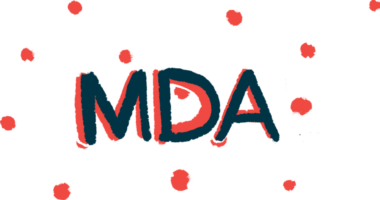 Discussion
Discussion
A day in the life of a Duchenne muscular dystrophy survivor
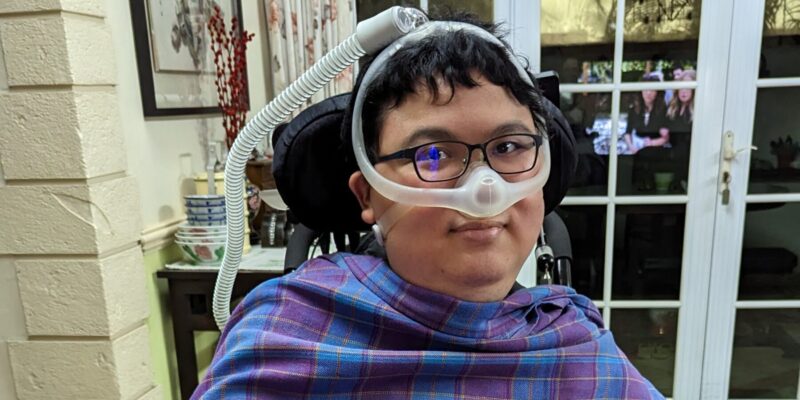
Shalom Lim is a 27-year-old with Duchenne muscular dystrophy. He lives in Singapore, working for a charity for animal service companions and pursuing his passion for music and theater. (Photos courtesy of Shalom Lim)
Living with Duchenne muscular dystrophy (DMD) has affected my ability to do many things I used to love, such as brushing my teeth, dressing, sketching cartoons, eating snacks, handwriting assignments with teacher-praised penmanship, painting garden scenes, and playing FIFA on the Playstation. I also miss riding horses and swimming with my late older brother, Isaac, a fellow DMD patient-survivor who sadly passed away three years ago from heart failure due to DMD complications.
This loss was my most significant blow to date, but I find comfort in the memories of our strong bond. We found solace in knowing we were not alone, as two of our uncles also had DMD. Today, due to disease progression, I rely on full-time caregivers and use a ventilator and powered wheelchair.
Despite DMD’s physical challenges and the risk of premature death from cardiac or respiratory complications, I don’t see it as a death sentence or impending doom. Instead, it’s part of my identity. My physical limitations don’t define me — I rise above them daily with support and resilience.
My morning routine
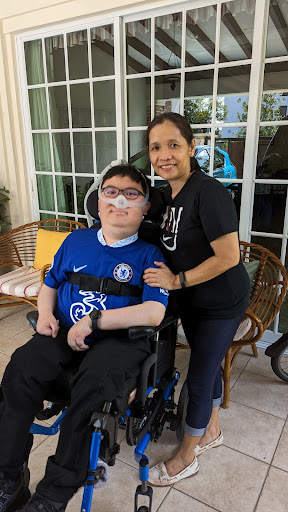
Shalom with his longtime caretaker, Glenda.
Each day begins with a call to my caregiver, Glenda, who has been with us since 2006 and is like a second mum to me. She helps me with my morning routine, which includes cleaning my face, switching my breathing masks, and recording my vital signs as my cardiologist and doctor-father advised. Using a patient lift, Glenda, with another assistant, helps me transition from bed to wheelchair. Once settled, she assists with brushing my teeth and retakes my vitals, as they vary when I’m seated. I then go on the cough assist, which helps clear my throat due to mucus buildup and reduces the risk of a chest infection.
I also take a peppermint tablet (Colpermin) to alleviate gastric discomfort from my overnight ventilator. I prefer it without the capsule — swallowing is challenging.
Medication regimens
Every day, I take my medications following the same routine. Due to my weak throat and gullet muscles, I dissolve all my oral tablets in water as I can’t swallow them whole.
In the mornings. I take three oral medications for my heart, which help my heart function and slow the progression of my cardiomyopathy, a heart condition caused by Duchenne.
Aside from my critical heart medications, I’m gradually reducing my use of deflazacort (marketed as Emflaza in the U.S. and Calcort in the U.K.), an oral corticosteroid for treating Duchenne, typically for younger patients. A Duchenne specialist from the U.S. informed me that due to my current full-time reliance on a BiPAP ventilator for breathing support, the benefits of the steroids for my pulmonary health had peaked. I began relying full time on my BiPAP ventilator for respiratory support in December 2019, shortly after Isaac had passed away.
For my bone health, I receive infusions of zoledronic acid (available as Reclast, Zometa, and Aclasta) every six months. This intravenous (into-the-vein) therapy administered at the hospital helps maintain my bone mass density and treat osteoporosis, both affected by long-term physical immobility from DMD and the continued use of deflazacort.
The rest of my day
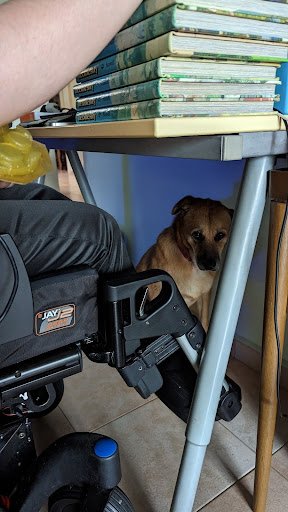
Shalom working from home.
After moving to my home office, I catch up on soccer news and enjoy a coffee before beginning my work with K9Assistance. I recruit new businesses that are open to welcoming assistance dogs.
When my day ends, I love to unwind by watching my favorite TV shows and listening to music, varying from pop classics like “Ain’t No Mountain High Enough” by Marvin Gaye to modern pop ballads like “Always Remember Us This Way” by Lady Gaga.
Before I go to bed, I talk with my parents or chat with my partner over Zoom or on the phone.
Finally, my bedtime routine mirrors my morning routine but in reverse. My caregiver brushes my teeth, uses a patient lift to transfer me to my bed, and then switches my breathing masks in preparation for sleep.
Expecting the unexpected
As my condition has progressed to an advanced stage where I am now considered to be on life support because of my full-time dependence on the ventilator to breathe and, hence, survive, my life has become a lot more unpredictable and scary. I can only hold on to the faintest glimmer of hope that comes from believing and believing that God and my loved ones will pull me through each crisis.
Sometimes, during my transfers from my bed to my wheelchair, my ventilator may disconnect from the portable battery, or the breathing tube may wear out from use or overheating. Maintaining your ventilator system, having a backup, and preparing for equipment failure are crucial to ensure safety.
In the early days of July 2022, I contracted dengue fever for the first time, and it was utterly sudden and unexpected. It was the worst experience of my life, which says a lot coming from someone who barely survived his second bout of pneumonia 11 years before. The day I was admitted to the hospital, I felt breathless even while using my ventilator, as I was running a very high fever, and my lungs weren’t sustaining me. Then, the unthinkable happened. During my bed transfer, my equipment malfunctioned!
I thought that was the end of the line for me. After struggling to breathe for a minute, I passed out. Fortunately, the hospital staff in the high-dependency ward didn’t panic and came to my rescue. When I awoke, I was lying on the bed hooked up to the hospital ventilator with vital sign monitoring on. Crisis averted! But that harrowing incident taught Glenda and me to always be prepared with a backup plan.
Psychosocial challenges
With traumatic life-or-death situations happening almost daily for a DMD patient-survivor like me, one can only imagine the toll it had taken on my emotional, mental, and social well-being. Three months after my near-death experience, I was diagnosed with attention deficit-hyperactive disorder (ADHD) by a clinical psychologist. (It is not uncommon for someone with DMD to have ADHD or another neurological condition.)
I had long suspected that I wasn’t just physically disabled, as I had always felt different from my peers even before I started using a wheelchair. My academic grades nosedived, and my mental health ran off a cliff after Isaac passed away, culminating in clinical depression and suicidal ideation.
Antidepressants prescribed by my psychiatrist only worsened my psychological state at the time. I am now in the middle of tailing them off, along with the deflazacort corticosteroid that helped maintain and safeguard my pulmonary health but led to chronic anxiety, depression, and insomnia due to its adverse psychosocial effects.
Relationships-wise, DMD does not prevent me from building healthy connections and social bonds with my caregivers and support network. Besides my parents and older siblings (I have a sister who thankfully isn’t a carrier of Duchenne like my mum is), I’m incredibly close to Glenda, who has faithfully helped care for me since I was 10 years old. Our relationship has grown to be resilient through all the ups and downs of my health condition. Without her, I wouldn’t be here today.
Hope, against all odds
Despite the challenges of living with Duchenne, it’s a significant part of my identity. It’s shaped me into a proud rare disease survivor since childhood. Despite its difficulties, living with DMD is rewarding. Quoting “The Shawshank Redemption”: “Remember … hope is a good thing, maybe the best of things, and no good thing ever dies.” I hope my story brings you encouragement and joy.
Muscular Dystrophy News Today is strictly a news and information website about the disease. It does not provide medical advice, diagnosis or treatment. This content is not intended to be a substitute for professional medical advice, diagnosis, or treatment. Always seek the advice of your physician or other qualified health provider with any questions you may have regarding a medical condition. Never disregard professional medical advice or delay in seeking it because of something you have read on this website.
About the Author
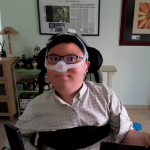
Shalom Lim is a University of Liverpool graduate, having completed an honors bachelor’s degree in criminology and security in July 2021. Born with Duchenne muscular dystrophy and diagnosed at 4 months old in 1996, he is currently based in the Eastern part of Singapore. His hope for his column is to advocate for the health and well-being of the muscular dystrophy community in Southeast Asia.
Recent Posts
- How AI can support my daily life with Duchenne muscular dystrophy
- Ahead of this year’s MDA Conference, association’s CEO speaks of ‘hope’
- A blind date with a book encourages me to dust off my social life
- New research reveals protein pathway that can slow muscle repair
- Dreaming of solutions to the Olympic-sized challenges of FSHD
Related Articles
-
 Discussion
Discussion
-
-

